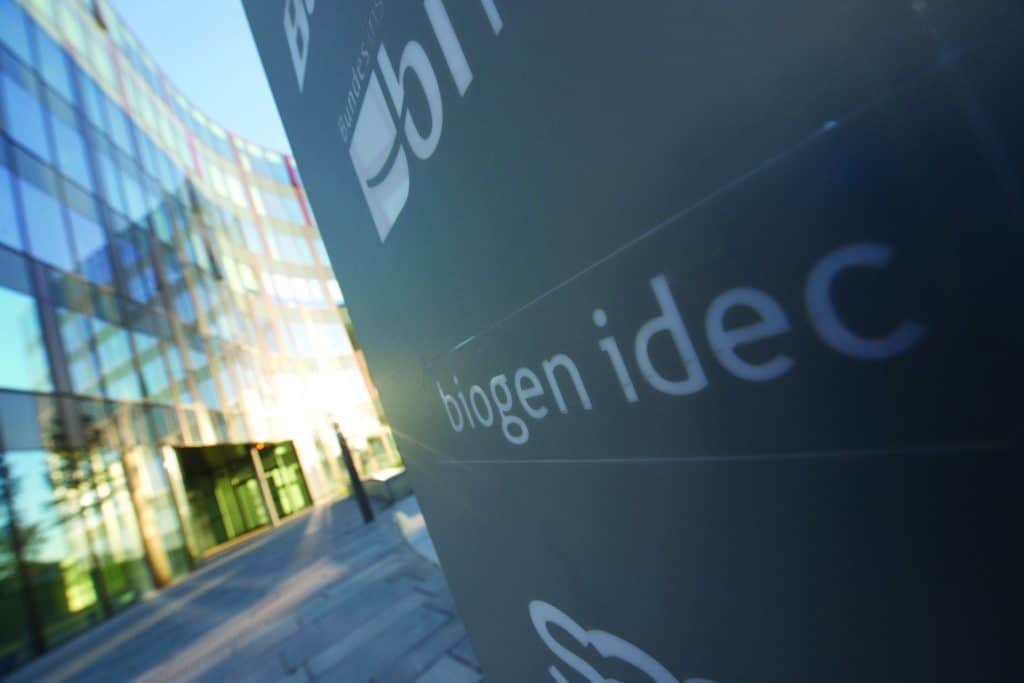
Biogen shortens name and posts positive Alzheimer’s results
pharmafile | March 23, 2015 | News story | Sales and Marketing | AD, Alzheimer's, BIIB037, Biogen, MS, Parkinson's, aducanumab, idec
Biogen Idec is to be known only as Biogen hence forth as the US biotech also reveals positive early results from its Alzheimer’s drug.
Biogen which merged with Idec Pharmaceuticals over 10 years ago, is now dropping half its name and will also have a new logo to accompany its rebranding.
Along with this news it has announced better-than-expected clinical trial results for its experimental Alzheimer’s drug aducanumab (BIIB037).
In its Phase 1b study the treatment demonstrated an “acceptable safety profile and positive results on radiologic and clinical measurements in patients with prodromal or mild Alzheimer’s disease (AD)”.
“This is the first time an investigational drug for Alzheimer’s disease has demonstrated a statistically significant reduction on amyloid plaque as well as a statistically significant slowing of clinical impairment in patients with prodromal or mild disease,” says Alfred Sandrock, the firm’s group senior vice president and chief medical officer.
“Based on these results, we are advancing the aducanumab clinical programme to Phase III with plans to initiate enrolment later this year.”
Presented at the 12th International Conference on Alzheimer’s and Parkinson’s Diseases and Related Neurological Disorders in France, Biogen notes treatment with aducanumab produced a dose- and time-dependent reduction of amyloid plaque in the brain.
Amyloid plaque is said to play a key role in the development of the symptoms of AD. In exploratory analyses, a dose-dependent, statistically significant effect of slowing clinical decline was observed the biotech adds.
Whilst the firm will be buoyed by these latest results some analysts and doctors have concerns over the drug’s safety, as 25% of patients on the highest dose discontinued the treatment due to adverse effects that included swelling on the brain.
The industry which has trialled similar drugs for many years is often met with disappointment in Alzheimer’s, but has carried on simply because the sales opportunities are so big.
AD is a progressive neurodegenerative disorder characterised by cognitive decline and behavioural disturbances that eventually result in a person’s inability to perform daily activities. In 2010, it was estimated that 25 million individuals were living with AD worldwide.
Biogen is mostly known for its MS portfolio but recent acquisitions and collaborations along with today’s announcements – are beginning to paint a picture of a firm that is branching out and keen to climb further up the big pharma ladder.
Its chief executive George Scangos says he will keep Biogen focussed on developing drugs for some of the hardest-to-treat diseases.
“Five years down the road, with some luck, we’ll have an Alzheimer’s drug that’s getting approved,” he told Reuters. “I hope we can transform the treatment of MS. By that time, we will have made substantial progress on ALS and other nerve degenerative diseases, spinal muscular atrophy in kids. All that stuff is on our plate.”
Brett Wells
Related Content

Voyager Therapeutics shares data from preclinical programmes for Alzheimer’s treatment
Voyager Therapeutics has announced new data from is two preclinical programmes targeting pathological tau for …

Eisai shares new data for Leqembi for Alzheimer’s treatment
Eisai and Biogen have announced that Eisai has shared new data for Leqembi (lecanemab-irmb) 100mg/mL …

Biogen’s biosimilar Tofidence approved by FDA
Biogen has announced that the US Food and Drug Administration (FDA) has approved Tofidence (tocilizumab-bavi) …








